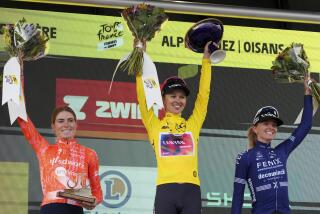As Usual, the Clothes Maketh the Cyclist
- Share via
PARIS — Lance Armstrong was not the only winner Sunday in the Tour de France.
While the yellow jersey awarded to the man who finishes the three-week race in the least amount of time is the most prestigious, there were other prizes that were contested over the 20 stages and 2,125 miles.
There was a green jersey that went to the winner of the most points.
At the end of a 10-lap trip up and down the Champs-Elysees on Sunday there was shoulder-to-shoulder bumping by two Australians, Baden Cooke and Robbie McEwen, as they crossed the finish line.
While France’s Jean-Patrick Nazon was the popular winner of the final stage, Cooke and McEwen were fighting for the final points available. By edging out McEwen for second in the stage, Cooke won the green jersey by two points.
In each stage, there are races-within-the-race. At predetermined locations along each course, riders can earn points and bonus seconds by finishing first, second or third in sprints.
It was the way Jan Ullrich, desperate to make up ground, gained two seconds on Armstrong in Friday’s flat stage. While Armstrong and Ullrich crossed the stage finish line together, Ullrich had sneaked into second place during an intermediate sprint. Armstrong, paying close attention, took off after Ullrich to finish third in the sprint but Ullrich gained two extra bonus seconds.
The first, second and third-place winners of each stage also receive bonus seconds -- 20 for the winner, 12 for the runner-up, eight for the man in third.
Even after Armstrong had raced to a dominating win in the 15th stage, an exhausted Ullrich still sprinted to the finish line so he could claim the eight precious seconds given to the third-place finisher.
There are similar awards for climbers. A polka dot jersey goes to the “King of the Mountains.”
Each hill climb during the tour is rated. The easiest is called a Category 4, a little harder is Category 3, to Category 2 and Category 1 and finally “hors category,” which defines such monstrous mountains as L’Alpe d’Huez. “Hors category” means “without category,” or beyond categorizing.
Again, the riders who reach the top of each climb receive points based on the difficulty of the climb. France’s Richard Virenque won the polka dot jersey for a record-tying sixth time.
There is an award for best team, won this year by Danish Team CSC, led by American Tyler Hamilton. Hamilton competed with a broken collarbone he suffered in a 35-rider crash at the end of the first stage. Even though he knew his chances of finishing on the podium ended with that crash, Hamilton kept competing partly so his team had a chance to win.
It is even possible to win the Tour de France and not win a single stage. American Greg LeMond was the last man to do that in 1990. But he wasn’t the only one. There were four others -- Firmin Lambot in 1922, Roger Walkowiak in 1956, Gastone Nencini in 1960 and Lucien Aimar in 1966.
More to Read
Go beyond the scoreboard
Get the latest on L.A.'s teams in the daily Sports Report newsletter.
You may occasionally receive promotional content from the Los Angeles Times.










